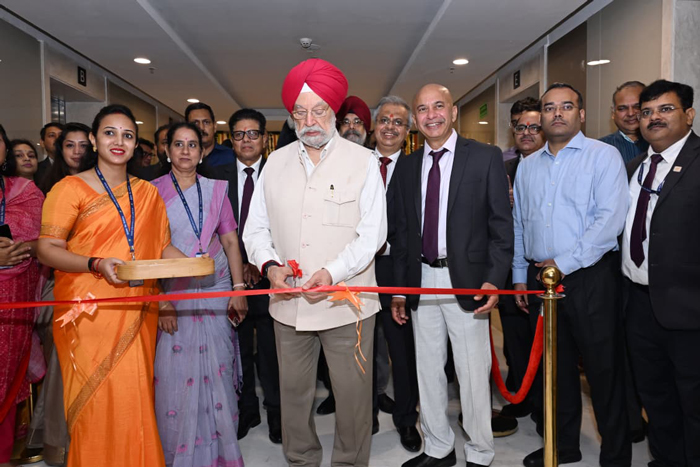In a boost to domestic manufacturing, Puri also launched a new smart gas meter facility set up by IGL in partnership with Genesis Gas Solutions, with production expected to commence in October 2025.
The supply of natural gas across sectors has become increasingly seamless over the past decade, as India undertakes an ambitious energy transition, Union Minister for Petroleum & Natural Gas Hardeep Singh Puri has stated.
“On the first day of Navratri, 2.5 million new LPG connections were announced under the Pradhan Mantri Ujjwala Yojana, which provides clean cooking fuel to economically weaker sections. With this, the total number of connections under the scheme will rise to around 106 million,” Puri said while inaugurating the new office of the country’s largest compressed natural gas (CNG) distributor, Indraprastha Gas Ltd (IGL), in New Delhi on Tuesday.
He went on to outline India’s broader energy transition, citing the expansion of LPG connections from 140 million before 2014 to more than 330 million today, the strengthening of the natural gas pipeline network from 14,000 km to over 22,500 km, and the country’s emergence as one of the fastest-growing refining hubs globally.
India’s rapid increase in refining capacity has already positioned it as the world’s fourth-largest refining centre. With further expansion, it is poised to become the third-largest and eventually one of the global centres of refining activity, as smaller standalone refineries elsewhere may struggle to remain viable.
Speaking of India’s renewed momentum in exploration and production, Puri cited promising results from recent finds in the Andaman Basin. He noted that between 2006 and 2016, exploration activity had slowed due to prevailing perceptions of abundant global supply. However, new discoveries are now reinforcing confidence in India’s geological potential.
“This expansion not only strengthens India’s energy security but also creates jobs, supports MSMEs, and enhances regional economic growth.”
In a boost to domestic manufacturing, Puri also launched a new smart gas meter facility set up by IGL in partnership with Genesis Gas Solutions. The plant will produce nearly one million gas meters annually, including smart and prepaid variants. Production is expected to commence in October 2025.
IGL: A Key CGD Player
Puri extensively highlighted IGL’s evolution since its incorporation in 1998 into a key player in the city gas distribution (CGD) sector. The company currently operates 956 CNG stations—nearly 12 per cent of India’s total—has connected over 3.07 million households with piped natural gas (PNG), supplies clean energy to 5,300 industries and 7,100 commercial establishments, sells 9.3 million standard cubic metres per day (MMSCMD) of natural gas, and refuels 2.2 million CNG vehicles daily.
He noted that IGL has extended PNG connections to 250 villages in Delhi, bringing urban amenities such as clean cooking fuel to more than 100,000 rural households. This expansion, he said, is not just about infrastructure, but about transforming lives, improving air quality, and reducing emissions while bridging the rural-urban divide.
“IGL’s journey has been one of innovation, growth, and social impact. This new office is not just a workplace but a reaffirmation of its commitment to expanding reach, strengthening operations, and advancing India’s clean energy transition.”
Puri also commended IGL’s adoption of state-of-the-art technologies, including SAP in data processing, geographic information system (GIS), advanced analytics, business intelligence dashboards, integrated security and vehicle tracking systems, prepaid and self-billing apps, chatbots, e-billing, and automated meter reading. These innovations, he said, strengthen operations, improve efficiency, and enhance customer service, setting benchmarks for the CGD sector.
Looking ahead, Puri said India’s green energy transformation will involve a diversified mix including biogas, liquefied natural gas (LNG), hydrogen-enriched CNG, electric vehicle (EV) charging, and swapping infrastructure. While CNG and electric vehicles will see increased adoption, traditional fuels such as petrol will continue to play a role, especially in rapidly growing economic hubs like the National Capital Region.


